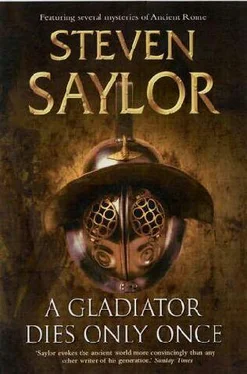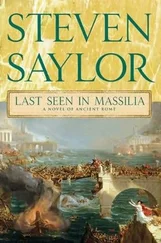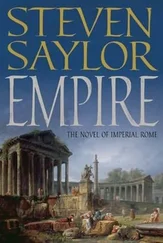Steven Saylor - A Gladiator Dies Only Once
Здесь есть возможность читать онлайн «Steven Saylor - A Gladiator Dies Only Once» весь текст электронной книги совершенно бесплатно (целиком полную версию без сокращений). В некоторых случаях можно слушать аудио, скачать через торрент в формате fb2 и присутствует краткое содержание. Жанр: Исторический детектив, на английском языке. Описание произведения, (предисловие) а так же отзывы посетителей доступны на портале библиотеки ЛибКат.
- Название:A Gladiator Dies Only Once
- Автор:
- Жанр:
- Год:неизвестен
- ISBN:нет данных
- Рейтинг книги:5 / 5. Голосов: 1
-
Избранное:Добавить в избранное
- Отзывы:
-
Ваша оценка:
- 100
- 1
- 2
- 3
- 4
- 5
A Gladiator Dies Only Once: краткое содержание, описание и аннотация
Предлагаем к чтению аннотацию, описание, краткое содержание или предисловие (зависит от того, что написал сам автор книги «A Gladiator Dies Only Once»). Если вы не нашли необходимую информацию о книге — напишите в комментариях, мы постараемся отыскать её.
A Gladiator Dies Only Once — читать онлайн бесплатно полную книгу (весь текст) целиком
Ниже представлен текст книги, разбитый по страницам. Система сохранения места последней прочитанной страницы, позволяет с удобством читать онлайн бесплатно книгу «A Gladiator Dies Only Once», без необходимости каждый раз заново искать на чём Вы остановились. Поставьте закладку, и сможете в любой момент перейти на страницу, на которой закончили чтение.
Интервал:
Закладка:
"I suppose… " The man seemed dubious, but then his face abruptly brightened, as if reflecting the glitter of sunlight on the coins I dropped into his hand.
Just then a guard approached, searched the fellow for weapons, and told him to step into the tent.
We did not have long to wait. Soon a lanky young man stepped out of the tent. His armored leather fittings seemed to have been tailored for a shorter, stockier man; I had noticed that many of Sertorius's junior officers were outfitted in similarly haphazard fashion. The young man pulled uncomfortably at the armholes of his leather shirt and peered into the crowd, looking rather put out. I caught his eye and beckoned for him to meet me at one side of the tent.
"Mamercus Claudius?" I said. "I come with a message from-" "What do you think you're doing, you idiot, summoning me from the commander's tent like that?" He was angry but kept his voice low. "I suppose I could have lined up with the rest for an audience with the general-"
"Who are you?"
"My name is Gordianus, called the Finder. This is my son, Eco. We've come all the way from Rome. Your grandfather sent me."
Mamercus seemed taken aback at first, then smiled ruefully. "I see. Poor grandfather!"
"Poor indeed," I said, "and poorer still for lack of your company."
"Is he well?"
"In body, yes. But his spirit is eaten away by fear for you. I've brought a message from him."
I produced the little folded tablet that I had faithfully brought all the way from Rome. The two thin plates of wood were bound to-gether with a ribbon and sealed with a daub of red wax, upon which Gaius Claudius had pressed his signet ring. Mamercus broke the seal, pulled the tablets apart, and gazed at the wax surfaces inside, upon which his grandfather had scratched his plea by his own hand, no longer having even a secretary to write his letters for him.
Had Mamercus's reaction been callous and uncaring, I would not have been surprised. Many an impatient, bitter, dispossessed young man in his situation might have scorned a doting grandparent's concern, especially if that grandparent had always supported the very establishment against which he was rebelling. But Mamercus's reaction was quite different. I watched the swift movement of his eyes as they perused the words and saw them glisten with tears. He clamped his jaw tightly to stop his lips from quivering. His evident distress made him look almost as boyish as Eco.
Gaius Claudius had not kept the contents of his letter secret from me. On the contrary, he had insisted that I read it:
My dearest grandson, blood of my blood, what has induced you to take thisfoolish course? Do you think to please the shade of your father by joining a hopeless struggle against those who destroyed him? If this were the only course open to you-if your own name and future had been ruined along with your father's and mother's-then honor might demand such a desperate course. But in Rome you still have my protection, despite your father's downfall, andyou can still make a career foryourself. We are woefully impoverished, to be sure, but together we willfind a way out of our misfortune! Surely the best revenge for your father would be for you to restore our family's fortunes and to make a placefor yourself in the state, so that when you are my age you can look back upon a long career and a world you have had a hand in shaping to your liking. Do not throw your life away! Please, I begyou, calm your passions and let reason guide you. Come back to me! The man who bears this message has funds sufficientfor your passage home. Mamercus, son of my son, I pray to the gods that 1 shall see you soon!
After a while, Mamercus pressed the tablets together and retied the ribbon. He averted his eyes in a way that reminded me of his grandfather. "Thank you for bringing the letter. Is that all?"
"Is it all?" I said. "I know what's in the letter. Will you honor his request?"
"No. Leave me now."
"Are you sure, Mamercus? Will you think on it? Shall I come back later?" "No!"
My commission from Gaius Claudius was specific: I was to locate Mamercus, to deliver the message, and to help Mamercus, if he chose, to escape unscathed from Sertorius's service. It was not incumbent on me to persuade him to leave. But I had come a long way, and now I had seen both the old senator's distress and his grandson's response to it. If Mamercus had reacted with derision, if he had be-trayed no love for his grandfather, that would have been the end of it. But his reaction had been quite the opposite. Even now, from the way he gently held the tablets, almost caressing them, and reached up to wipe his eyes, I could see that he was feeling a great flood of affection for the old man, and consequently, perhaps, considerable confusion over the choice he had made.
I thought it wise to change the subject for a moment. "You seem to have done well for yourself, here in Sertorius's army," I said.
"Better than I expected, in so short a time," admitted Mamercus. He tucked the tablets under his arm and smiled crookedly. "The commander was very glad to take me in. He gave me a position on his staff at once, despite my lack of experience. 'Look,' he said to everyone, 'a young Claudius, come all the way from Rome to join us! But don't worry, son, we'll be back in Rome before you know it, and it's the blasted Sullans who'll be searching for their heads!'"
"And do you believe that? Is that why you choose to stay?"
Mamercus bristled. "The question is, what's keeping you here, Gordianus? I've given you my answer. Now go!"
At that moment, the crowd before the commander's tent broke into a cheer. I heard the name of Sertorius shouted aloud in acclamation, and saw that the great man himself had emerged from the tent. He was a tall, robust-looking man with a strong jaw and a smile that radiated confidence. Years ago, he had lost an eye in battle. Other men might have been embarrassed by the defect, but Sertorius was said to consider his leather eye-patch to be a badge of honor. The many battle scars scattered over his arms and legs he considered to be his medals.
Some mortals possess a charismatic allure that is almost divine, that anyone can see at a glance, and Quintus Sertorius was such a mortal. This was a man whom other men would trust implicitly and follow without question, to glory or death. The cheers that greeted his appearance, from both his own soldiers and from the local petitioners, were absolutely genuine and spontaneous.
Then the cries died away to a whispered hush. Eco and I looked at one another, puzzled. The cheering was understandable, but what was this? It was the hush of religious awe such as one hears in Rome at certain ancient rites performed in the temples in the Forum, a barely audible welter of whispers and murmurs and muttered prayers.
Then I saw the remarkable creature that had followed Sertorius out of the tent.
It was a young fawn. Her soft pelt was utterly white, without a single spot of color. She gamboled after Sertorius like a loyal hound, and when he paused, she nuzzled against his thigh and lifted her snout for him to stroke. I had never seen anything like it.
The hush grew louder, and amid the strange dialects I heard snatches of Latin:
"The white fawn! The white fawn!"
"They both look happy-that must mean good news!"
"Diana! Bless us, goddess! Bless Quintus Sertorius!"
Sertorius smiled and laughed and bent down to take the fawn's head in his hands. He kissed her right on the snout.
This evoked an even louder murmur from the crowd-and from one onlooker, a loud, barking laugh. My dear mute son has a very strange laugh, alas, rather like the braying of a mule. The fawn's ears shot straight up and she cowered behind Sertorius, tripping awk-wardly over her spindly legs. Heads turned toward us, casting suspicious looks. Eco clamped his hands over his mouth. Sertorius peered in our direction, frowning. He saw Mamercus, then appraised me with a curious eye.
Читать дальшеИнтервал:
Закладка:
Похожие книги на «A Gladiator Dies Only Once»
Представляем Вашему вниманию похожие книги на «A Gladiator Dies Only Once» списком для выбора. Мы отобрали схожую по названию и смыслу литературу в надежде предоставить читателям больше вариантов отыскать новые, интересные, ещё непрочитанные произведения.
Обсуждение, отзывы о книге «A Gladiator Dies Only Once» и просто собственные мнения читателей. Оставьте ваши комментарии, напишите, что Вы думаете о произведении, его смысле или главных героях. Укажите что конкретно понравилось, а что нет, и почему Вы так считаете.










